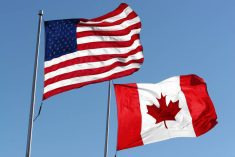In a week where Italy threatened to blow up the Canada-European Union free trade deal and the U.S. formally imposed $50 billion in tariffs on Chinese goods, there was actually some good news for Canadian farmers.
The federal government brought forward legislation yesterday to enact the Comprehensive and Progressive Trans Pacific Partnership.
The deal, better known as the TPP, is an 11 nation trade agreement that includes the key country of Japan.
Canada and the other 10 countries signed the agreement in March but it doesn’t take effect until six nations ratify the deal. More accurately, it takes effect 60 days after six nations ratify the deal.
Read Also

Farming Smarter receives financial boost from Alberta government for potato research
Farming Smarter near Lethbridge got a boost to its research equipment, thanks to the Alberta government’s increase in funding for research associations.
Commodity groups representing Canada’s pork, canola and wheat industries praised Trade Minister Francois-Philippe Champagne, who introduced the legislation needed to ratify the deal.
“Minister Champagne has shown great leadership in advocating for the CPTPP,” said Rick Bergmann, Canadian Pork Council chair and a hog producer from Manitoba.
“Ensuring our industry has access to diverse and growing markets is more important than ever. We are asking all members of the House of Commons to quickly ratify this agreement.”
Commodity groups and ag industry reps have been urging the federal government to ratify the CPTPP quickly because speed does matter for Canadian farmers.
Other nations in the CPTPP are moving forward with ratification and it’s possible that six countries could approve the deal by the end of 2018.
If Canada is not among the first six, countries such as Australia, New Zealand and Mexico will enjoy lower tariffs and the benefits of CPTPP before Canadian exporters. Plus, they’ll have the advantage of establishing new business relationships in key markets such as Japan.
For instance, Japan imposes a tariff on Canadian beef of 38.5 percent, or in some cases 50 percent. In the first year of the CPTPP that tariff would drop to 27.5 percent and eventually sink to nine percent.
Estimates suggest that the tariff reduction could boost Canadian beef sales to Japan by $200 million annually in the short term.
“This is probably the most significant trade deal since NAFTA,” said Dennis Laycraft, executive vice-president of the Canadian Cattlemen’s Association.
Moving ahead with legislation for CPTPP came on the same day that Italy’s new agriculture minister said his country would not ratify the Comprehensive Economic and Trade Agreement.
Gian Marco Centinaio told an Italian newspaper that CETA doesn’t protect Italy’s specialty foods, such as cheeses and meats.
“We will not ratify the free trade treaty with Canada because it protects only a small part of our PDO (protected designation of origin) and PGI (protected geographical indication) products,” Centinaio said, as reported by Deutsche Welle, Germany’s national broadcaster.
Italy produces hundreds of food products with PDO and PGI labels, such as Parmigiano Reggiano cheese and Prosciutto di Parma ham.
Centinaio claimed the free trade deal will hurt Italian farmers and the country’s food industry because counterfeit products could threaten legitimate Italian foods.
CETA came into effect last year and Canada’s meat industry believes it will open up new markets for Canadian beef and pork. However, all EU nations have to ratify the deal, so the news out of Italy is concerning.
Meanwhile, U.S. President Donald Trump’s unpredictable trade strategy was on full display this morning.
The White House said it would proceed with a 25 percent tariff on $50 billion worth of Chinese products. Trump proposed the tariffs earlier this spring but Friday’s move formalizes the decision. The tariffs, on more than a 1,000 categories of Chinese goods, will take effect July 6.
China will likely respond and act on its proposed tariffs on American ag commodities, such as soybeans.
“For American farmers this isn’t theoretical anymore, it’s downright scary,” said Brian Kuehl, executive director of Farmers for Free Trade, a lobby group.
“It’s no longer a negotiating tactic, it’s a tax on their livelihoods. Within days, soybean, corn, wheat and other American farmers are likely to be hit with retaliatory tariff of up to 25 percent on exports that keep their operations afloat. When they do, they (farmers) are not going to remain silent.”
Contact robert.arnason@producer.com


















